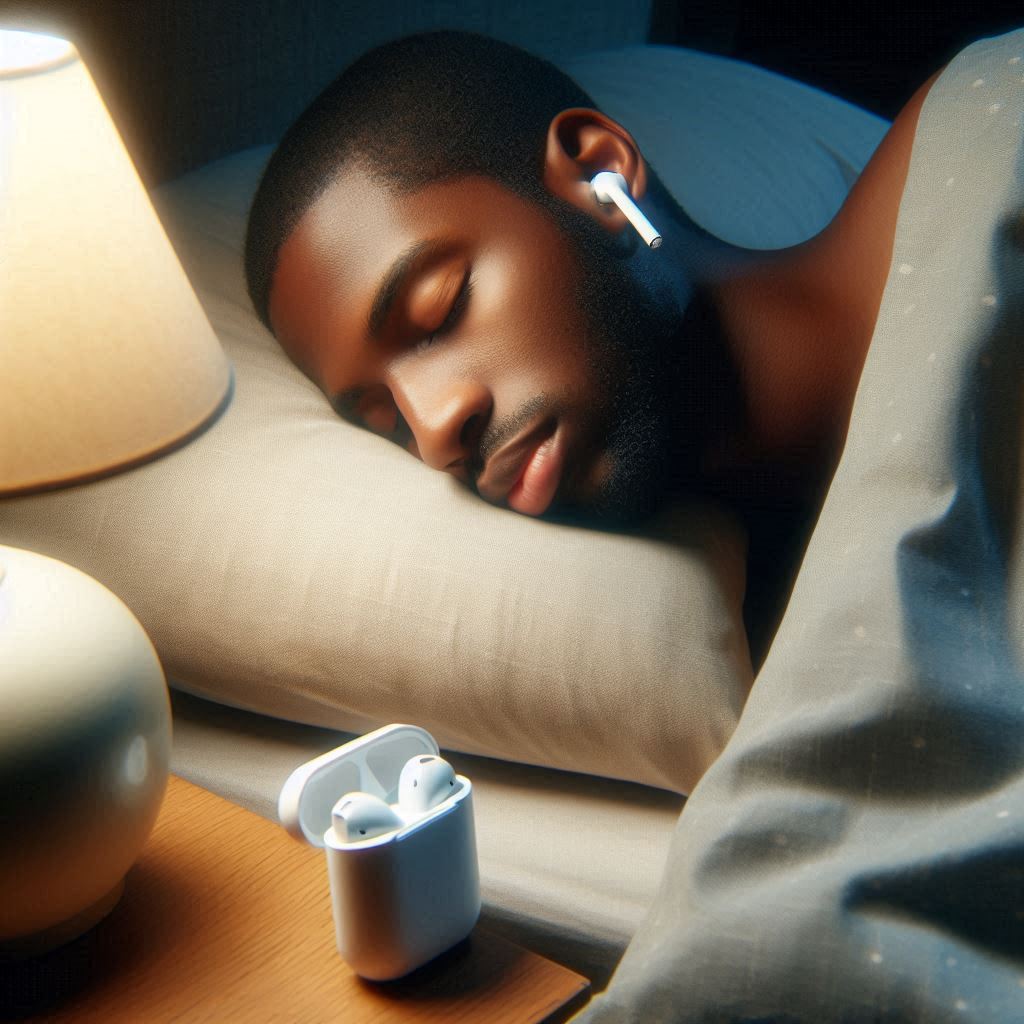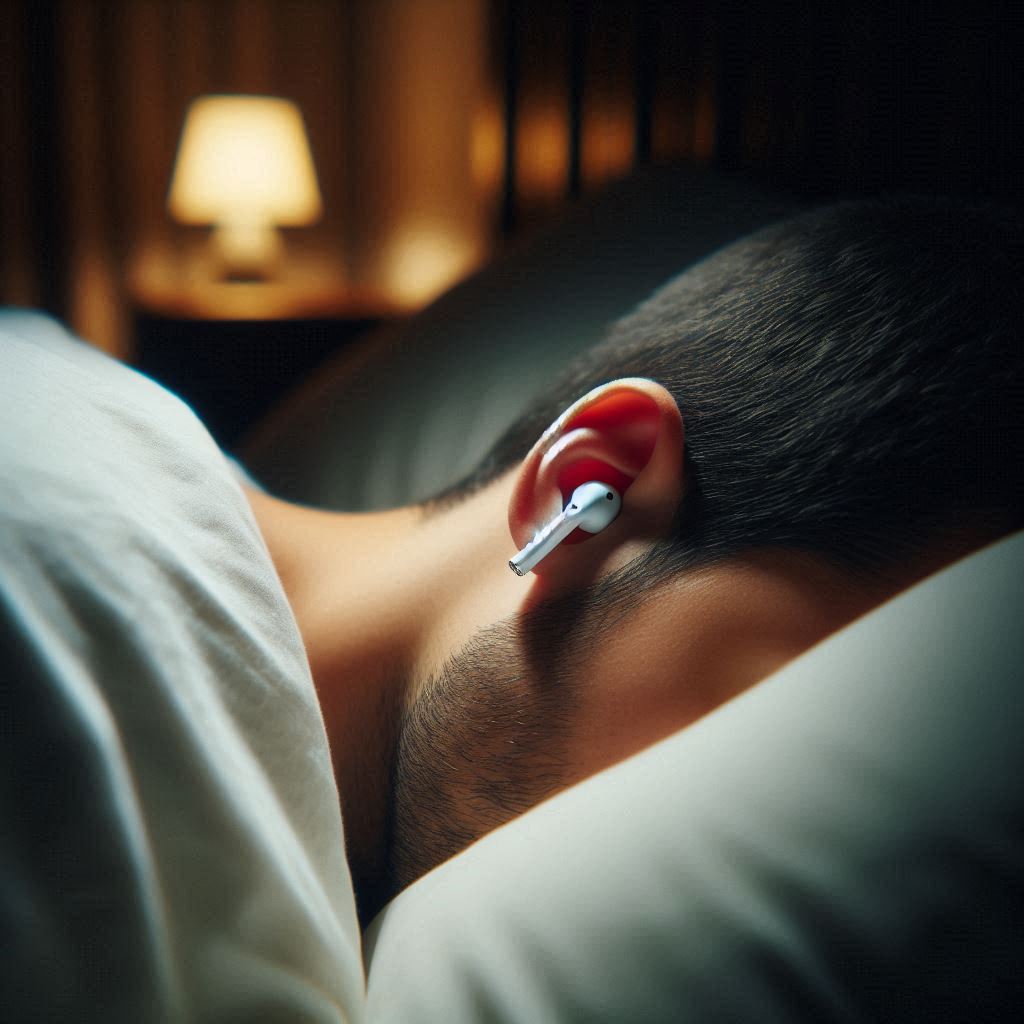Due to their ease of use and excellent sound clarity, AirPods have become an essential part of everyday life. Many people like to use AirPods to listen to music and videos or join virtual meetings. How do they feel when you wear them to bed? Is it secure? This article will talk about the pros and cons of” Is sleeping with AirPods bad” and give valuable advice to people who decide to do it.
Table of Contents
Introduction
Whether sleeping with AirPods is bad relies on several things, such as your habits, your ear health, and the model of AirPods you have. This guide gives an in-depth overview to help you make a smart choice.
The Benefits of Sleeping with AirPods
1. Noise Cancellation for Better Sleep
Active noise cancellation (ANC) in the AirPods Pro and AirPods Max can help block out noise from the surroundings, like city sounds or traffic, making it easier to sleep in noisy places.
2. Listening to Relaxing Sounds
For many people, relaxing music, white noise, or guided meditation can help them sleep better. AirPods offer a comfortable, wireless option for hearing these sounds without disturbing others.
3. Convenience
You don’t have to worry about tangled wires with AirPods because they are wireless. This makes them more comfortable to wear than regular earphones or oversized headphones.

Is Sleeping with AirPods Bad? Potential Risks
1. Ear Health Concerns
a. Earwax Buildup
When you wear AirPods for long periods, they can block airflow, causing earwax to build up. This can cause pain, hearing loss, or infections.
b. Pressure and Discomfort
If you sleep on your side, sleeping with AirPods can put pressure on your ears, which can cause pain, discomfort, or even ear infections if you do it often.
2. Sleep Disruption
While some people find it helpful to listen to music while they fall asleep, others may have problems, like sound keeping them from getting deep, restful sleep.
3. Safety Hazards
There are possible safety risks when you bring electronics to bed with you. While you sleep, your AirPods could fall out, get lost in your clothing, or even get broken. Some people may also have a small chance of choking.
4. Radiation Exposure
Even though AirPods only give off small amounts of non-ionizing radiation, people are still worried about what this will do to them in the long run. Some people prefer to keep wireless devices away from their heads for extended periods.

Tips for Safely Sleeping with AirPods
If you still want to sleep with your AirPods on, even though there are risks, here are some things you can do to help avoid problems:
1. Clean Your AirPods Regularly
Clean your AirPods often to avoid ear infections and earwax growth. To prevent them from getting wet, wipe them down with a clean, lint-free cloth.
2. Use a Comfortable Volume Level
If you listen to loud sounds for a long time, it can hurt your hearing. Make sure the noise is low to protect your ears and sleep better.
3. Choose the Right Sleep Position
You might want to use only one AirPod in the ear that isn’t pressed against the pillow if you sleep on your side. The pressure decreases, making it less likely that the AirPod will fall out.
4. Use a Sleep Timer
Many apps have a sleep timer feature that stops playing after a specific time. This can help keep you from waking up and expose you to less sound while you sleep.
5. Opt for a Sleep Headband
A sleep mask with built-in speakers might be a better option if AirPods are too uncomfortable. These headbands are made to be comfortable and don’t stick out as much as earbuds.
Exploring Alternatives to Sleeping with AirPods
If the risks of sleeping with AirPods bother you, here are some safer options:
1. White Noise Machines
With a white noise machine, you can create a comfortable environment for sleep without using headphones. These gadgets emit a consistent sound that blocks out other noises.
2. Pillow Speakers
You can also listen to music while you sleep with pillow speakers. You can put these speakers inside or under your pillow to listen to your favorite music while sleeping.
3. Sleep Headphones
Sleep headphones and headbands with built-in speakers are a comfortable way to listen to music while you sleep. They have good sound quality and don’t pose the same risks as earplugs.
Expert Opinions
1. Audiologists’ Perspective
Audiologists usually tell people not to wear headphones for an extended period, especially while they sleep. They ask you to let your ears “breathe” so you don’t have to deal with long-term pressure and the risk of getting illnesses.
2. Sleep Experts’ Perspective
Sleep experts warn that sounds can wake you up at night. As an option, they suggest white noise machines or turning off your audio when you’re asleep.
Real-Life Experiences
1. Customer Reviews
Talking to other people who sleep with AirPods can give you helpful information. Some users say that noise cancellation helps them sleep better, while others say it makes them uncomfortable, causes health problems with their ears, or causes them to lose their AirPods at night.
2. Case Studies
Case studies can show how different situations can be helpful. For example, one person might get an ear infection after using it for a long time, while another finds that relaxing sounds help them sleep.
Conclusion
So, is it bad to sleep with AirPods? The answer varies on what each person likes and how they usually behave. There are some benefits, like blocking out noise and listening to soothing sounds, but there are also significant risks, like ear health issues, trouble sleeping, and safety risks.
If you decide to sleep with AirPods, cleaning them regularly, keeping the noise low, and changing the way you sleep can help lower the risks. Alternatively, you could look into safer choices like white noise machines, pillow speakers, or sleep headphones.
Frequently Asked Questions
1. Can sleeping with AirPods cause ear infections?
Yes, wearing AirPods to bed can lead to ear infections because of the buildup of earwax and a moist environment that makes it easy for bacteria to grow. To avoid this, clean your AirPods often and don’t wear them every night.
2. Is it safe to use noise cancellation features on AirPods while sleeping?
Noise reduction can help some people sleep better by blocking out noise they don’t want to hear. But make sure the noise is low and be aware of problems that could happen with your ears because of the pressure.
3. Will sleeping with AirPods affect my hearing?
Listening to loud music while you sleep can harm your hearing over time. To prevent this, set your AirPods to a comfortable, low volume, and consider using a sleep timer to limit your exposure.
4. Can I sleep with one AirPod instead of both?
Yes, sleeping with only one AirPod lowers the pressure on your ear and the chance of pain, ear infections, or the AirPod coming out. This is especially true for people who sleep on their side.
5. Are there alternatives to sleeping with AirPods?
Other options include white noise machines, pillow speakers, and headphones or caps with built-in speakers. With these choices, you can listen to music while you sleep without the risks associated with earbuds.